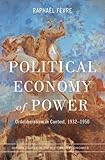A political economy of power : Ordoliberalism in context, 1932-1950 / Raphaël Fèvre.
Series: Oxford studies history economics seriesPublisher: New York : Oxford University Press, [2021]Copyright date: ©2021Description: ix, 267 pages ; 25 cmContent type:- text
- 9780197607800
- 338.9009 23
- HC54 .F48 2021
| Item type | Current library | Shelving location | Call number | Materials specified | Status | Notes | Barcode | |
|---|---|---|---|---|---|---|---|---|
 BOOKs
BOOKs
|
National Law School | General Stacks | 338.9009 FEV (Browse shelf(Opens below)) | HB | Available | Recommended by Prof. Babu Mathew | 40127 |
Browsing National Law School shelves,Shelving location: General Stacks Close shelf browser (Hides shelf browser)

|

|
No cover image available |

|

|

|

|
||
| 338.9 CYP The process of economic development | 338.9 JAY Poverty, inequality, and population : | 338.9 STI Globalization and its discontents | 338.9009 FEV A political economy of power : Ordoliberalism in context, 1932-1950 / | 338.91 BAN Poor economics | 338.91095409045 ENG The price of aid : the economic cold war in India / | 338.927 AGY Introducing just sustainabilities : policy, planning, and practice / |
Includes bibliographical references (pages 219-251) and index.
"Today, ordoliberalism is at the centre of the ongoing debate about the foundations, the present governance and future prospects of the European Union-and yet we do not dispose of a comprehensive definition of it. Whenever we talk of the dominance of the German model, the discussion should involve a detailed picture of ordoliberal principles. This book retraces the intellectual history of ordoliberalism, focusing in particular on the works of its main representatives Walter Eucken and Wilhelm Röpke, together with references to the contributions of Franz Böhm, Alexander Rüstow, Leonhard Miksch and Friedrich Lutz. The book highlights the crucial, albeit overlooked, role of economic and political power in the making of ordoliberal thought. More precisely, the book shows that ordoliberalism, in its ideological, epistemological, theoretical and political components, can be defined as a political economy of power, i.e. a form of economic knowledge, whose primary objective is to analyse the sources, the action and the impact of power within society. By doing so the book will offer a new perspective on ordoliberals' key concepts built in the inter-war, while contextualizing them within a broader intellectual project"-- Provided by publisher.
There are no comments on this title.
